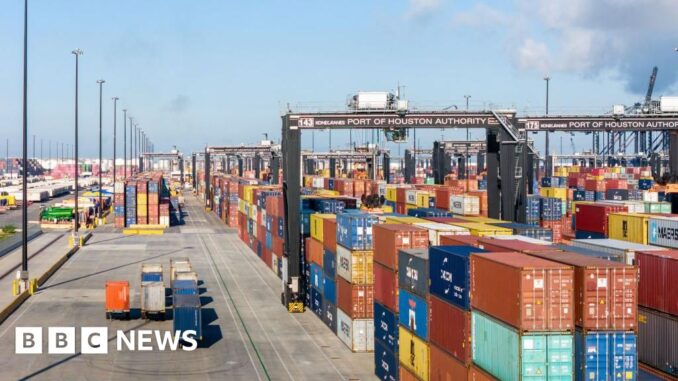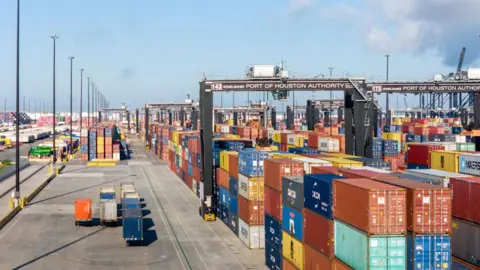
 Getty Images
Getty ImagesA dockworkers’ strike is set to shut down ports across much of the US indefinitely, threatening significant trade and economic disruption ahead of the presidential election and the busy holiday shopping season.
Tens of thousands of members of the International Longshoremen’s Association (ILA) are preparing to walk out on Tuesday at 14 major ports along the east and gulf coasts, halting container traffic from Maine to Texas.
Barring a last-minute intervention, the action will mark the first shutdown in almost 50 years.
President Joe Biden has the power to suspend the strike for 80 days for further negotiations, but the White House has said he is not planning to act.
What is the strike about?
The two sides are fighting over a six-year master contract that covers about 25,000 port workers employed in container and roll-on/roll-off operations, according to the US Maritime Alliance, known as USMX, which represents shipping firms, port associations and marine terminal operators.
Talks have been stalled for months and the current contract between parties expires on Monday.
Union boss Harold Daggett has called for significant pay increases for his members, while voicing concerns about threats from automation.
Under the previous contract, starting wages ranged from $20 to $39 per hour, depending on a worker’s experience. Workers also receive other benefits, such as bonuses connected to container trade.
Mr Daggett has indicated the union wants to see pay increases of five dollars per year over the life of the six-year contract, which he estimated amounted to about 10% per year.
The ILA, which says it represents more than 85,000 people, said workers are owed after shipping firm profits soared during the Covid pandemic, while inflation hit salaries. It has warned to expect a wider strike of its members, including those not directly involved in this dispute, though the figures are unclear.
USMX has accused the union of refusing to bargain, filing a complaint with labour regulators that asked them to order the union back to the table.
What items will be affected by the strike?
Time-sensitive imports, such as food, are likely to be among the goods first impacted.
The ports involved handle about 14% of agricultural exports shipped by sea and more than half of imports, including a significant share of trade in bananas, chocolate and coffee imports, according to the Farm Bureau.
Other sectors exposed to disruption include tin, tobacco and nicotine, Oxford Economics said. Clothing and footwear firms, and European carmakers, which route many of their shipments through the Port of Baltimore, will also take a hit.
Imports in the US surged over the summer, as many businesses took steps to rush shipments ahead of the strike.
“I don’t think we will see immediate, significant economic impacts…but over the course of weeks, if the strike lasts that long, we can begin to see prices rise and for there to be some shortages in goods,” said Seth Harris, a professor at Northeastern University and a former White House adviser on labour issues.
What will the economic impact be?
More than a third of exports and imports could be affected by the strike, hitting US economic growth to the tune of at least $4.5bn each week of the strike, according to Grace Zemmer, an associate US economist at Oxford Economics, though others have estimated the economic hit could be higher.
She said more than 100,000 people could find themselves temporarily out of work as the impact of the stoppage spreads.
“This is really a trigger event, one that will see dominoes fall over the coming months,” said Peter Sand, chief analyst at ocean freight analytics firm Xeneta, warning that the stand-off also has the potential push up wider shipping costs.
That would hit consumers and businesses which tend to rely on so-called “just-in-time” supply chains for goods, he added.
How could this affect the US election?
The stand-off injects uncertainty into the US economy at a delicate time.
The economy has been slower and the unemployment rate is ticking higher as the US election approaches in six weeks.
The strike risks putting President Biden in a tricky spot.
US presidents can intervene in labour disputes that threaten national security or safety by imposing an 80-day cooling-off period, forcing workers back on the job while negotiations continue.
In 2002, Republican President George W Bush intervened to open ports after 11 days of a strike action by dockworkers on the west coast.
The US Chamber of Commerce business group has called on President Biden to take action.
“Americans experienced the pain of delays and shortages of goods during the pandemic-era supply chain backlogs in 2021. It would be unconscionable to allow a contract dispute to inflict such a shock to our economy,” said Suzanne P. Clark, president and chief executive of the business group.
The ILA’s Mr Daggett endorsed Democrat Biden in 2020, but has been critical of the president more recently, citing pressure on west coast dockworkers to reach a deal a year ago. He met with Donald Trump in July.
Although any strike chaos is likely to hurt Democrats, the cost of alienating allies in the labour movement just weeks before the election would be greater, said William Brucher, a professor of labor studies and employment relations at Rutgers University.
But public support of strikes could be tested by the dispute, which has been championed by Mr Daggett, who was acquitted of having links to organised crime in a 2004 case by federal prosecutors. A related civil suit remains unresolved.
Films such as the 1954 classic On the Waterfront once defined the dockworkers union’s image, but Prof Brucher said he thought that historical memory had largely faded and many people shared the dockworkers’ concerns about cost-of living and automation.
“As much as it could sway public opinion against the ILA, a strike by ILA members is their decision and I don’t think they will be swayed by public opinion in any meaningful way,” he said.
“What is more likely to happen is the pressure of a strike will likely force the employers back to the table with a much more substantial offer.”


Be the first to comment